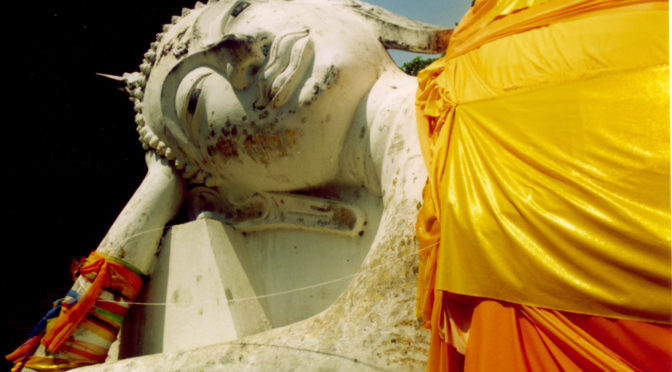- On Thai Massage and Cultural Appropriation - November 27, 2015
- English-Thai Herb Name Glossary - March 15, 2015
- A Beginner’s Guide to the Academic Study of Chinese Buddhist Texts - December 8, 2013
Here are some resources for getting started in the study of Chinese Buddhist texts. This page will be updated on a periodic basis, so feel free to suggest any additions via email or Facebook. The date above reflects the last time this page was modified.
Preliminary Readings
The Encyclopedia of Buddhism has an entry-level essay on the Buddhist canon by (see Vol. 1, pp. 111–5).
The Encyclopedia of Religion (2nd Edition) has two articles that serve as useful starting points. Under “Buddhist Books and Texts” in Vol. 2, see entries on Canon & Canonization (pp. 1251–61) and Translation (pp. 1265–8).
For more historical information on the development of the Chinese canon, see Mizuno, Kogen. Buddhist Sutras: Origin, Development, Transmission. Tokyo: Kosei Publishing Co., 1995.
Navigating the Canon
CBETA’s digitized, corrected Buddhist canon is available online at http://www.cbeta.org/index.htm, and in jCBReader (an off-line Java app available for multiple platforms) at http://www.cbeta.org/reader/jcbreader.php. I prefer the reader, as is has many powerful search functions. A tutorial on the current version of the software is available here: http://www.youtube.com/watch?v=dAPhm3kiJOA
Many people prefer to use SAT’s online canon: http://21dzk.l.u-tokyo.ac.jp/SAT/index_en.html. One advantage is that it is linked directly to individual entries in the Digital Dictionary of Buddhism. However, in some recent tests, I have found that the interface is buggy with certain features only working intermittently. When working on a text, you should always check the SAT version against the CBETA version, as there may be differences in punctuation and sometimes corrections that have been made in the latter that can be quite helpful.
If you want to check the original text, both the Korean Tripitaka http://kb.sutra.re.kr/ritk_eng/search/searchBranch.do and the Dunhuang corpus http://idp.bl.uk are available online.
For cross-references to the Pāli, Sanskrit, and Tibetan canons, use the online version of Lancaster & Park http://www.acmuller.net/descriptive_catalogue/index.html or CBETA’s tool http://jinglu.cbeta.org which also includes Manchurian and some Western translations.
Chuck Muller’s index page http://www.buddhism-dict.net/ddb/indexes/taisho-ddb.html links to the Digital Dictionary of Buddhism entries on each text and to Marcus Bingenheimer’s comprehensive running list of sutras available in translation.
For quick look-ups of titles, attributed authors, and attributed dates for texts that aren’t in the DDB, use the Fascicule Annexe du Hōbōgirin (1978 ed.) and Christian Wittern’s online index: http://kanji.zinbun.kyoto-u.ac.jp/~wittern/can/can2/ind/canwww.htm
Dictionaries
The best online dictionary, which incorporates numerous print dictionaries, is Chuck Muller (ed.), Digital Dictionary of Buddhism: http://www.buddhism-dict.net/ddb/
For problem characters, type one of its radicals (or better yet, more than one) into this search field: http://chise.zinbun.kyoto-u.ac.jp/ids-find If you still can’t find a Unicode character, use the DIY tool here: http://www.sinosplice.com/life/archives/2013/02/26/creating-characters-by-svg
Sanskrit, Pāli, and Tibetan terms are included in the DDB, and the home page links to standard online dictionaries for these languages and a number of other language tools: http://www.buddhism-dict.net/ddb/
Other online dictionaries you might want to try include (in no particular order): http://www.buddhism-dict.net/dealt,http://dictionary.buddhistdoor.com/en/, http://taotao-project.org/translator,http://www.hanyudazidian.com/bolshaya_kitayskaya_entsiklopediya, http://www.zdic.net.
Other Useful Websites
William Bodiford’s reference guide for Buddhist Studies has useful background information and bibliographic information: http://www.alc.ucla.edu/refguide/refguide.htm
For secondary scholarship, see Chuck Muller (ed.) H-Buddhism Bibliography Project on Zotero: https://www.zotero.org/groups/h-buddhism_bibliography_project
When you can’t figure it out yourself, you can always throw out a question on the Scholars of Buddhist Studies Facebook page: https://www.facebook.com/groups/221346307889011/
